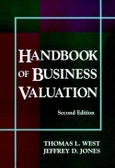The most complete guide to business valuation written by industry-leading valuation specialists! Handbook of Business Valuation Second Edition In this thoroughly revised and updated edition of the number-one guide to business valuation, nearly 50 experts provide expert advice and guidance on all facets of the subject. This is a single-source guide to valuation approaches and methods, in addition to all of the procedures necessary to accurately value a business. The Second Edition of the Handbook of Business Valuation enables you to find precisely the information you need; just go directly to the chapter concerning the topic you are interested in. There is no need to read the entire volume-it's quick and easy. This is the only valuation book you need. It provides chapters on valuing specific businesses, such as: software companies, radio and cable stations, medical practices, home-based businesses, and many more, plus a special chapter on researching business valuation information on the Internet.
An entire chapter on commonly used rules of thumb
Business valuation from the perspective of the buyer, seller, lawyer, lender, and others
All updated information, plus much that's new
Important sections on family limited partnerships, intellectual property issues, minority interests, and much more
An entire chapter on commonly used rules of thumb
Business valuation from the perspective of the buyer, seller, lawyer, lender, and others
All updated information, plus much that's new
Important sections on family limited partnerships, intellectual property issues, minority interests, and much more
Table of Contents
THE PURPOSE, MARKET, AND RESOURCES FOR VALUING BUSINESSES.Reasons for Value a Business and Who Should Do It.
Valuation Issues from a Seller's Perspective.
Valuation Issues from a Buyer's Perspective.
Valuation Issues from an Intermediary's Perspective.
The Investment Banker's Perspective on Due Diligence for Mergers, Acquisitions, and Securities Offerings.
Valuation Issues from the Legal Perspective.
Valuation From the Lender's Perspective.
Notable Differences Between Middle Market and Small Businesses.
Where to Find Industry Information and Guideline Market Data.
VALUATION APPROACHES AND METHODS.
Recasting Financial Statements.
To Infinity and Beyond: Statistical Techniques Appraising the Closely Held Business.
Machinery and Equipment Valuation Approaches and Methods Used in Conjunction with a Going Concern Business.
Rules of Thumb: What They Are and How to Use Them.
The Direct Market Data Method of Valuing Midsize and Smaller Closely Held Businesses.
The Market Approach Using Public Company Data.
The Excess Earnings Method.
Multiple of Discretionary Earnings Method.
Capitalization of Earnings: An Income Approach.
Discounted Future Benefits Method: An Income Approach.
VALUATION ISSUES BY INDUSTRY.
Valuing Retail Businesses.
Valuing Manufacturing Businesses.
Valuing Automobile Dealerships.
Valuing Restaurants.
Valuing Medical Practices.
Valuing Accounting Firms.
Valuing Radio and Cable TV Businesses.
Valuation of Hotels and Motels.
Valuing a Software Company.
Valuing Publishing Companies.
Valuing Home Healthcare Businesses.
Valuing Lumberyards and Home Centers.
Valuing Printing Businesses.
Valuing Home-Based Businesses.
Valuing Country Businesses.
SPECIAL ISSUES.
Perspectives on Valuing a Minority Interest in a Private Company.
Valuation for ESOP Purposes.
Valuing Family Limited Partnerships and Limited Liability Company Interests for Estate Planning Purposes.
Valuing Intellectual Property.
Corporate Taxes and Valuation.
The Use and Abuse of Experts.
Index.








